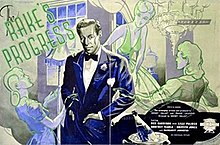The Rake's Progress (film)
 From Wikipedia the free encyclopedia
From Wikipedia the free encyclopedia
| The Rake's Progress | |
|---|---|
 British trade ad | |
| Directed by | Sidney Gilliat |
| Written by | Frank Launder Sidney Gilliat Val Valentine (story) |
| Produced by | Frank Launder Sidney Gilliat |
| Starring | Rex Harrison Lilli Palmer |
| Cinematography | Wilkie Cooper |
| Edited by | Thelma Connell |
| Music by | William Alwyn |
Production company | |
| Distributed by | Eagle-Lion Distributors |
Release date |
|
Running time | 120 minutes |
| Country | United Kingdom |
| Language | English |
| Budget | $1,120,000[1] |
| Box office | over $1 million (US rentals)[2] |
The Rake's Progress is a 1945 British comedy-drama film.[3] In the United States, the title was changed to Notorious Gentleman.[4] The film caused controversy with U.S. censors of the time, who trimmed scenes for what was considered graphic amoral and sexual content.[4]
Plot
[edit]The plot follows the career of upper-class cad Vivian Kenway (Rex Harrison). He is sent down from Oxford University for placing a chamber pot on the Martyrs' Memorial. Sent to South America after his father pulls a favour from a friend, he is fired for heckling the managing director while drunk.
A friend offers him a job, but he responds by seducing his wife and is found out. His jobs decline, as he moves from employment as racing driver to shop assistant to dancing partner. He lives a life of womanising and heavy drinking and constantly runs up large debts, which his family has to pay. One girl tries to kill herself. Driving while drunk and taking risks, he crashes and causes the death of his father, Colonel Kenway (Godfrey Tearle). Kenway is eaten up by guilt in consequence. Another girl tries to rescue him.
The plot diverges from the theme of the Rake's Progress paintings by having him redeem himself by a hero's death in World War II.
Cast
[edit]- Rex Harrison as Vivian Kenway
- Lilli Palmer as Rikki Krausner
- Godfrey Tearle as Colonel Robert Kenway
- Griffith Jones as Sandy Duncan
- Margaret Johnston as Jennifer Calthrop
- Guy Middleton as Fogroy
- Jean Kent as Jill Duncan
- Patricia Laffan as Miss Fernandez
- Marie Lohr as Lady Parks
- Garry Marsh as Sir Hubert Parks
- David Horne as Sir John Brockley
- Alan Wheatley as Edwards
- Brefni O'Rorke as Bromhead
- John Salew as Burgess
- Charles Victor as Old Sweat
- Jack Melford as race team member (uncredited)
Production
[edit]Sidney Gilliat says the idea for the film came entirely from Val Valentine "he thought of it on the bus."[5] He also says Harrison never suggested Lili Palmer for the female lead it came from Frank Launder.[6]
Critical reception
[edit]The New York Times described the film as "an oddly deceptive affair which taxes precise classification. It plays like a comedy-romance, but all the way through it keeps switching with brutal abruptness to the sharpest irony...As a consequence, a curious unevenness of emphasis and mood prevails, and initial sympathy with the hero is frequently and painfully upset";[7] while more recently, TV Guide wrote, "the film is filled with wit and style. It does not treat its unattractive subject with sympathy, yet remains sensitive and touching."[8]
References
[edit]- ^ "London West End Has Big Pix Sked". Variety. 21 November 1945. p. 19. Retrieved 18 March 2023.
- ^ Variety (1 September 2018). "Variety (November 1946)". New York, NY: Variety Publishing Company – via Internet Archive.
- ^ "The Rake's Progress (1945)". BFI. Archived from the original on 12 July 2012.
- ^ a b Karl Williams. "Notorious Gentleman (1945) – Sidney Gilliat – Synopsis, Characteristics, Moods, Themes and Related – AllMovie". AllMovie.
- ^ Fowler, Roy; Haines, Taffy (15 May 1990). "Interview with Sidney Gilliat" (PDF). British Entertainment History Project. p. 130.
- ^ Gilliat p 128-129
- ^ Crowther, Bosley. "THE SCREEN; 'Notorious Gentleman,' British Film in Which Rex Harrison Plays Deceptive Role, Opens Its Run at the Winter Garden".
- ^ "Notorious Gentleman". TVGuide.com.
- Pym, John (2002). Time Out film guide. Harmondsworth [Eng.]: Penguin. ISBN 0-14-029395-7.
External links
[edit]- The Rake's Progress at IMDb
- The Rake's Progress at AllMovie
- The Rake's Progress at the BFI's Screenonline
- Review of film at Variety